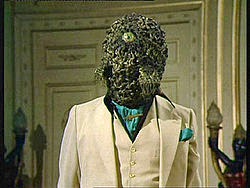By season’s end, just about everything. The final three
completed series of the season rank among the worst in the show’s history, as
bad acting, directing and design work against material that is already weak. By
the end, strikes at the BBC scuttle the final serial, but more about in a bit.
Destiny of the Daleks
It gets off to an uneven start with the return of the Daleks
and their mad creator, Davros. Terry Nation contributes the script (at least
his name is on the title card; word is that Adams wrote quite a bit of it
himself), which turns out to be his last for the show. It’s a pretty uneven
ride, hurt by David Gooderson as Davros. He isn’t able to build up the same
level of mad anger that made Michael Wisher’s performance so brilliant. Here,
the Daleks are at war with another race of robots (humanoids, mainly memorable
for their braided hair). They need the original organic factor to win. It’s up
to the Doctor, Romana and a few rag-tag crash survivors to scuttle all of the
plans for universal domination. Money problems are already in effect here,
giving the episodes as rag tag of a vibe as the survivors.
Here is the one saving grace of the season. We have: A
terrific script by Douglas Adams; great guest turns by Julian Glover, Catherine
Schell and Tom Chadbon; they went to Paris (Paris!) to film. The plot (which
Adams reused a bit in his Dirk Gentry books) involves an alien split across
human history by an accident at the dawn of life on Earth. A plot involving
time travel, multiple copies of the Mona Lisa, and the possible end of all life
on the planet twists and turns for a quartet of thrilling and funny episodes.
It’s all downhill from here.
Creature from the Pit
Perhaps having spent all their money on a trip to Paris, the
production apparently spent about three pounds on the monster here, which is
basically an inflated blob of plastic painted green. Horrible creature aside,
we also have a plot cobbled from Star Trek’s “Devil in the Dark” and some awful
mugging from Tom Baker. It makes for a largely forgettable experience, except
for the creature: we will never forget that as much as we want to.
Speaking of mugging from Tom Baker… His performance pushes
beyond the envelope here, especially in the final scenes. It doesn’t help that
director Alan Bromly clashed with everyone on the production and eventually was
fired/quit the production, forcing Williams to step in and finish the
storyline. The hard work directing doesn’t pay off, as the series is riddled
with unconvincing shots and wooden performances. There are a few highlights,
such as one character’s descent into drug-addicted hell, but mainly this is
another one to forget.
The Horns of Nimon
Our trilogy of doom ends with another interesting idea (a
recreation of the story of the Minotaur on an alien world) that is done in by
one of the worst performances in Doctor Who history. Graham Crowden was an
extremely talented performer with a long history on stage, film and television.
He was even offered the role of the Doctor, but turned it down. Here, as the
evil Soldeed, he puts on a full ham dinner. His calls of “Nimon,” as if he is
trying to find his pet cat, just won’t leave your mind, no matter how hard you
try.
Shada
The season finale was to feature a retired time lord, a
prison planet, and a script by Douglas Adams. Only about a third of the series
was completed, as continued industrial actions at the BBC left the recording
schedule in tatters. It’s hard to judge what remains, as it only includes the
exterior filming (including a dandy scene where the Doctor, on a bike no less,
is chased by some floating sphere thing) and some studio work. Adams, again,
later strip mined the story for Dirk Gentry, and the series was first compiled
with the existing footage and linking narration by Tom Baker, and then made
into an audio play with Paul McGann taking on the Doctor role.


